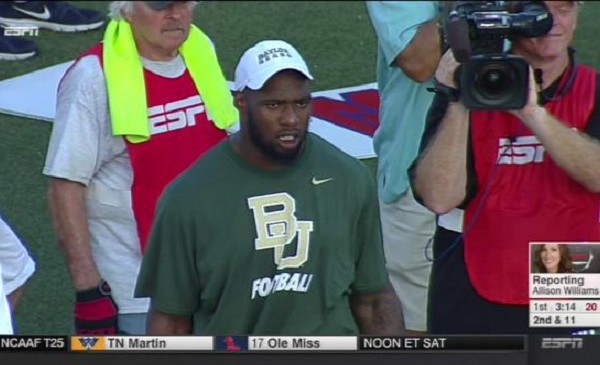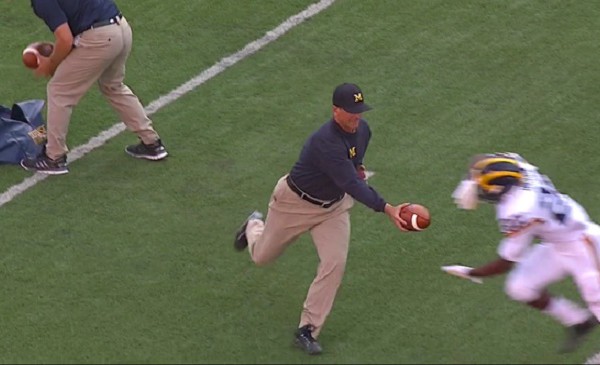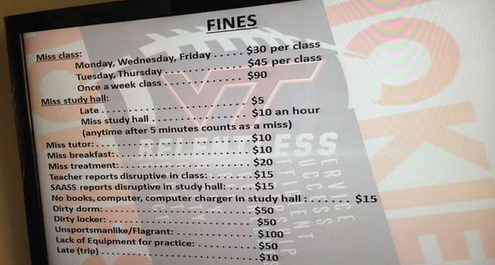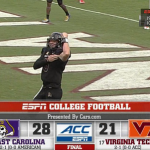College wasn’t a particularly enjoyable financial experience for a lot of students. For many, the most dreadful part of the week was hearing all the fun stuff your friends were about to invite you to do because you were going to have to tell them you couldn’t afford to go. So when I heard about the fines being imposed at Virginia Tech for stupid things like — actually, it really doesn’t matter what it was for because fining “amateur” athletes is stupid no matter how you break it down, but I digress. When I heard about the fines being imposed, my first reaction was just like everyone else’s — I was frustrated and upset that money was being taken from college kids. That’s really where I went wrong on this issue.
The problem here isn’t that money is being taken from college kids, but we’ll get to that in a second. Though to be perfectly clear, that’s a huge damn problem. College kids have enough on their plate without having to worry about a millionaire knocking on their dorm, noticing that it’s dirty, and fining them $50.
Sometimes finding money to eat for the month is a chore, that’s why the NCAA approved unlimited snacks and meals at no cost, even to walk-ons and partial scholarships. If I had single and double-digit bank balances throughout most of my time as an undergraduate, how many others can say the same?
Another problem with this situation, noted by Bleacher Report’s Michael Felder, the fine collection process has not historically been known for its leniency and forgiveness. This is a situation that has the potential to get out of hand really fast. No coach is going to throw a player off the team for repeatedly having a filthy dorm, but the amount of fines adding up can sure turn this situation into an uncomfortable one really quickly. It’s not taking a Hulk-sized leap to imagine that accrued fines could lead to a cold shoulder, or worse. When it comes to money, people aren’t always sensible and right now college football hasn’t earned the benefit of the doubt when it comes to money over academics, and that’s where we start to get into the real root of the problem.
The Idaho Statesman’s Brian Murphy asked the same question a lot of reporters were thinking when it came out that Virginia Tech hadn’t been the only school doing this: How widespread was this policy?: How many students have been affected by it?; And was this a bigger problem than people had realized?
At the heart of Murphy’s question was the idea that this seems to be good business for some coaches and good business models tend to spread. This all leads back to what I believe to be the real problem with this Virginia Tech story.
The problem isn’t that the coaching staffs feel they can fine players for arbitrary acts. The problem is that college football’s culture simply allows these things to happen.
The problem is the accumulation of evidence that this has never been about academics, that even those institutions taking their academics with integrity have made some sacrifices to that integrity along the way. There may still yet be some schools clinging to the last vestiges of academic amateurism, but they are a dying breed and will soon be stomped out by manifest destiny. It’s become impossible to hold on to the notion that this is about academics. They’re not having a Math Bowl in Australia.
This is about the business of sport and the business of winning. That is the problem with these fines. It’s just the latest example of coach after coach after coach producing behavior that can’t and shouldn’t support the academic narrative.
These are business policies, even if it is the business of winning. It would be unfathomable for any professor on campus to fine a student from any pocket of a student, but there will be people out there who quarrel over the source of the money and whether or not fining a stipend is acceptable. For some, they will rationalize this as a way to ensure a better assembly line for constructing wins. That’s the problem.
The fact that Virginia Tech’s AD has acknowledged the issue and said it will stop is completely irrelevant to the matter at hand. The issue is the culture that allowed these fines to exist in the first place. The priority on winning doesn’t just include $5m coaching salaries and making coaches the highest paid employees in their states, it’s much bigger than that.
It starts with the little things like thinking it’s okay to fine an amateur athlete, regardless of where the coaches are pulling the money. It starts with thinking it’s okay to block a move to another university because they might lose a game or two, only to relent when public pressure is applied. It starts with the idea that winning is somehow more important than the university mission statement.
The creation of a culture of winning has allowed these ideas to permeate throughout the landscape of college football. They manifest themselves in the form of coaches believing fines for forgetting a computer charger are acceptable. In doing stuff like this, the coaches are almost forcing players to buy into the idea that they can win on the field using this philosophy. A fine structure is often created out of a coaching philosophy for winning. There’s no guarantee that philosophy is a winner, though.
So, how is a player supposed to feel after he’s been levied $475 in fines for a season, but the team only won four games? Is that coach going to reimburse that money out of his severance package?
No, because you do what you have to do to win. And that’s the problem.
















